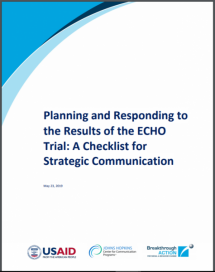Planning and Responding to the Results of the ECHO Trial: A Checklist for Strategic Communication
The Evidence for Contraceptive Options and HIV Outcomes (ECHO) trial was launched in 2015 to test the comparative risk of HIV acquisition among women using one of the following three contraceptive methods: depo-medroxyprogesterone acetate intramuscular (DMPA-IM), also known as Depo-Provera, two-rod levonorgestrel sub-dermal implant (LNG-Implant), branded as Jadelle, and the copper intrauterine device (Copper-IUD).
The trial enrolled 7,830 women across Eswatini, Kenya, South Africa, and Zambia, who agreed to be randomized by computer to one of the three methods. Results are anticipated in July 2019 and updated World Health Organization (WHO) guidelines are expected in late August 2019. This guidance was developed to ensure a coordinated and strategic response at the country level so that governments can take action to prepare for the results prior to their release and communicate the results—and subsequent WHO Guidelines—to relevant stakeholders in a timely fashion.
The ECHO study will provide scientific evidence about women’s contraceptive and HIV prevention choices, evidence that could have significant impact on family planning and HIV policies and programs. Governments in focus countries, with the support of the World Health Organization (WHO) and other partners, are preparing to respond to the ECHO results in a timely and strategic manner to ensure that national policies and programs take into account the need for women to have the information, knowledge and ability to make the best choice for their health. Early preparation will help avoid panic, deal with potential alarming headlines in the news, and adequately plan for programmatic and policy changes, if needed.
This tool provides guidance and suggestions for key communication activities that could be taken during three key timeframes:
- Prior to the release of ECHO results (before mid-July 2019)
- Immediately after the release of ECHO results/interim guidance from WHO (between mid-July and August–September 2019)
- After the release of WHO Guidelines (After September 2019)
It is recommended that the adaptation process is conducted in consultation with key national stakeholders, including donors, family planning and HIV implementing organizations, and civil society advocates in order to ensure a transparent, coordinated, and strategic response.
Last modified: June 17, 2019
Language: English

